Introduction
- Problem with access to healthcare among vulnerable groups: a current concern;
- Obstacles to providing access to care: lack of awareness, infrastructure, local policies;
- Flexibility and EBP as the basis for meeting the needs of vulnerable groups.
Health needs of populations that have difficulties accessing healthcare services have always been the source of concern for nurses across the United States. The process of managing the needs of people with restricted access to care is complicated in no small extent by the lack of awareness among the representatives of the target demographic (Mignon, 2016). Therefore, it is particularly important for a nurse to learn to cater to the health requirements of vulnerable groups. Access to health services is especially difficult for female inmates, which is why it is crucial to focus on the legal aspects of providing healthcare services to the target group.
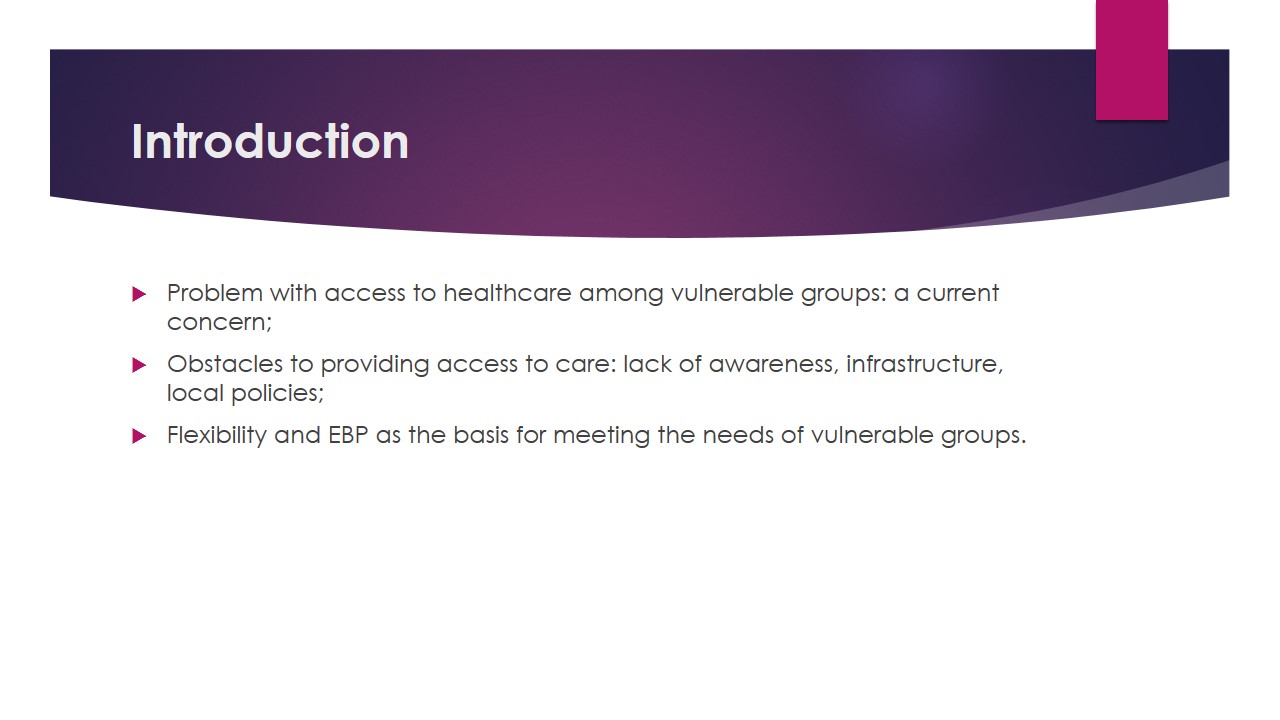
Historical Context
- Difficulties in providing healthcare assistance to women in prisons as an inherent problem;
- 1974: class action lawsuit against an NY correction institution due to inadequate medical care;
- 2012: the Sentencing Project and the opportunity for statistical analysis;
- 2019: focus on managing the needs of female inmates.
The process of providing healthcare to female prisoners has always been rather complicated for obvious reasons. In 2012, the Sentencing Project allowed calculating the changes in the statistics associated with the number of female inmates, concluding that there was an upward tendency (Van Hout & Mhlanga-Gunda, 2018). The observed trend spurred the further analysis of health concerns that women faced in prisons (Fazel, Hayes, Bartellas, Clerici, & Trestman, 2016). Currently, the problem with managing healthcare-related concerns of women in prisons has reached its peak (Van Hout & Mhlanga-Gunda, 2018). Therefore, introducing the strategy that would reduce the propensity among the target demographic to develop infectious diseases should be seen as a critical task.
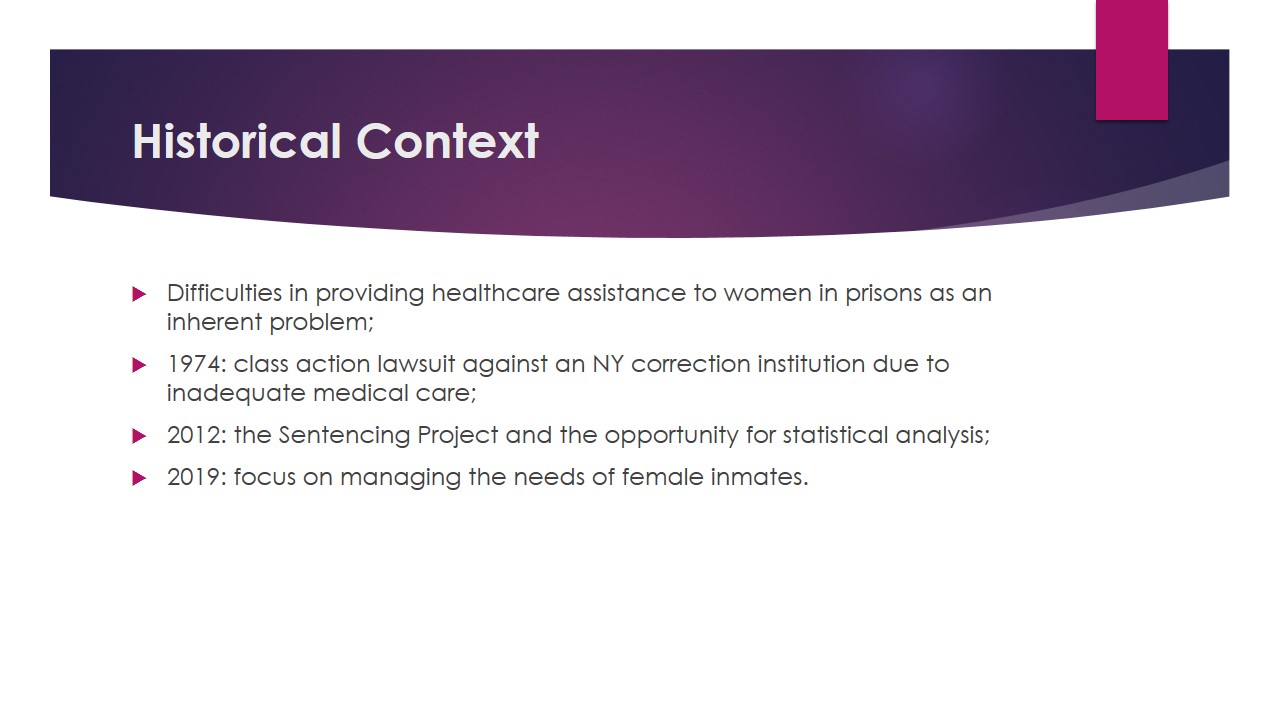
Special Needs
- Necessity to receive health-related education from experts;
- Need for access to basic healthcare services;
- Necessity to be shielded from the threat of infections;
- Need for the patient education process and the provision of critical knowledge;
- Need for fostering self-care (Van Hout & Mhlanga-Gunda, 2018).
Research has found that imprisoned women face a range of health-related challenges linked to the lack of basic health literacy and the absence of decent healthcare assistance and support (Mignon, 2016). Therefore, the target demographic requires both health education and better access to healthcare services and the support of healthcare professionals. Reports show that the treatment of infectious diseases is often neglected in female prisons (Van Hout & Mhlanga-Gunda, 2018). Therefore, the management of infections in the target setting should be seen as crucial in meeting the special needs of the selected vulnerable group. In addition, the general promotion of health-related knowledge and the supply of basic self-care products will have to be included in the program.
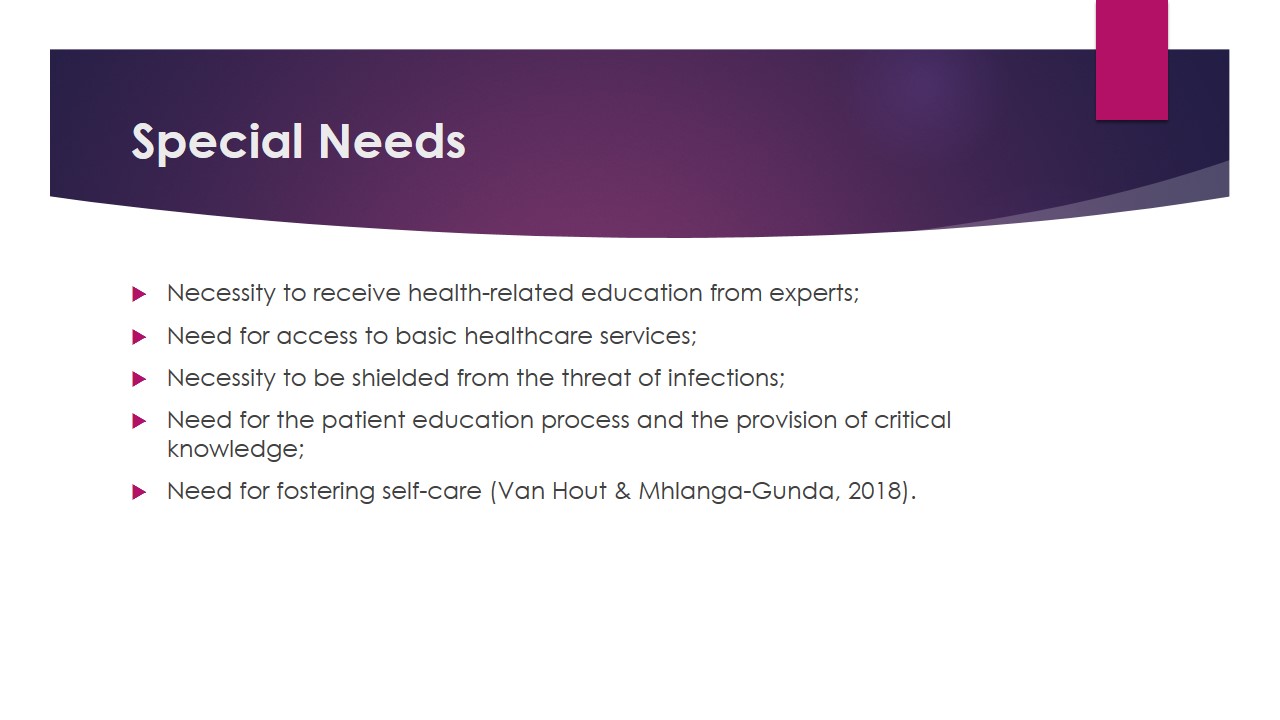
Selected Program
- Key focus: update of standards for infections prevention;
- Reinforcement of hygiene standards;
- Supervision of compliance with key sanitation techniques and guidelines;
- Focus on inmates’ education about hygiene and self-care;
- Provision of access to health-related services (specifically, immunization and diagnostic tools).
The program that will have to be put into practice in the prison setting will have to focus on the education of women that live in the specified areas, as well as the provision of access to basic health-related needs concerning the management of infections. In order to prevent infections diseases from spreading across female prisons and causing an epidemic, one will need to introduce updated guidelines for personal hygiene among female prisoners and the standards for preventing infections from posing a threat to inmates. Another aspect of health management that the program should cover concerns the misuse of drugs by female inmates. The described issue still poses a major threat to the well-being of female prisoners (Mignon, 2016). Therefore, rehabilitation programs that will allow the target demographic to fight their dependency and develop resilience to it will be needed.
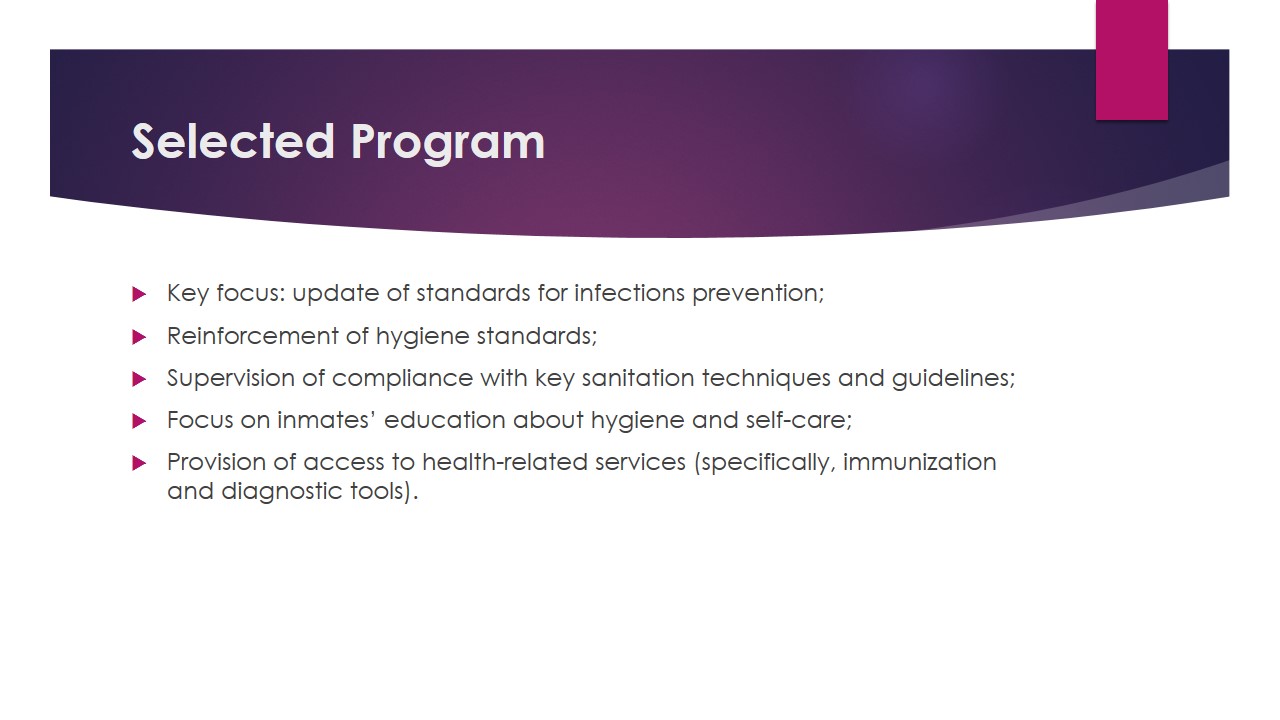
Empirical Support
- Sources of empirical support: observations made in prison;
- EBP source: recent articles and research on the subject matter (Fazel et al., 2016);
- Promotion of self-care and education in female inmates lead to positive results (Fazel et al., 2016).
The program in question will have to be guided by the empirical support received from trustworthy sources. Some of the recent studies insist that the focus on infectious diseases and especially STIs is indispensable for the management of the target demographics’ needs (Mignon, 2016). Moreover, further research outlines drastically low health literacy levels among female inmates, as well as the absence of the basic notion of self-care (Fazel et al., 2016). Thus, there is sufficient evidence for the significance of the proposed intervention and the positive effects that it will cause.
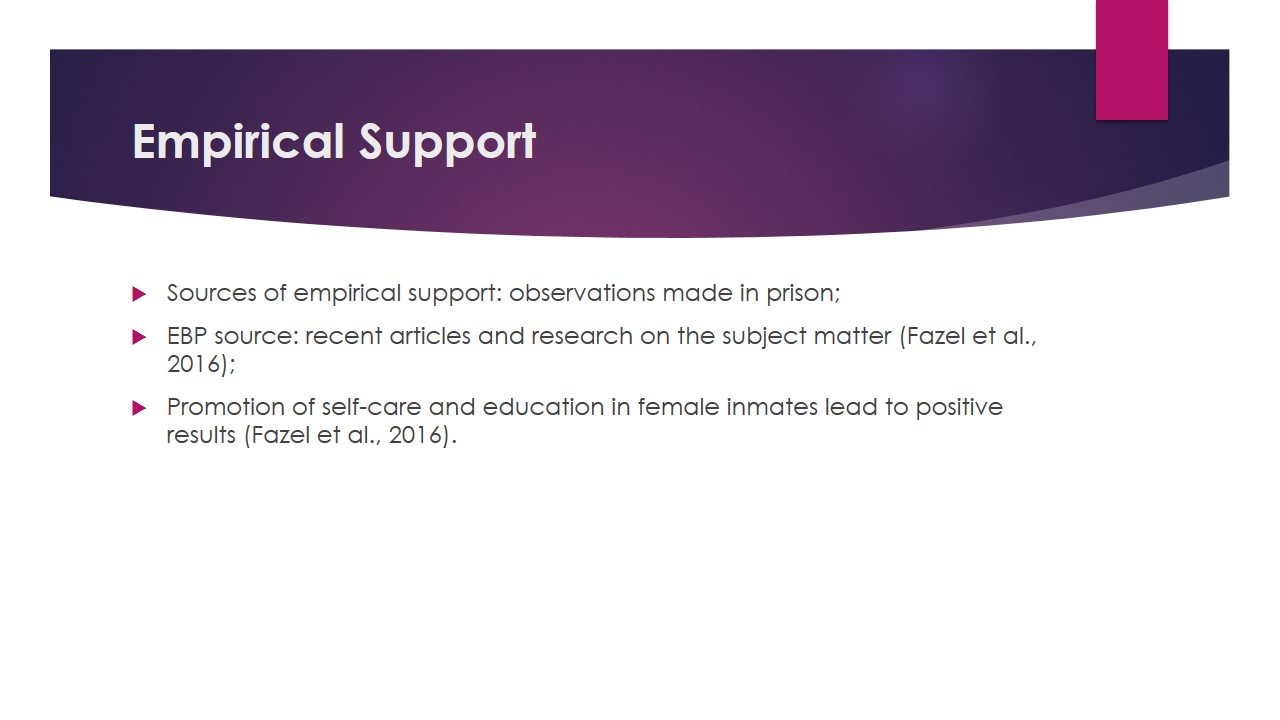
Conclusion
- Health education among female prisoners: a key step in managing the problem;
- Expected outcomes: a drop in the cases of infections among women in prisons;
- Tools and strategies: focus on building awareness, providing access to care, and educating.
The problem of health management in female prisons has been the point of concern in the healthcare environment for decades due to the lack of access to health services and low health literacy levels in the target demographic. A program aimed at increasing the availability of the described services and allow female prisoners to learn about the essentials of self-care Thus, the issue of infections and the comorbid complications among female inmates, as well as general inability to maintain personal hygiene, will be addressed in a timely and effective manner.
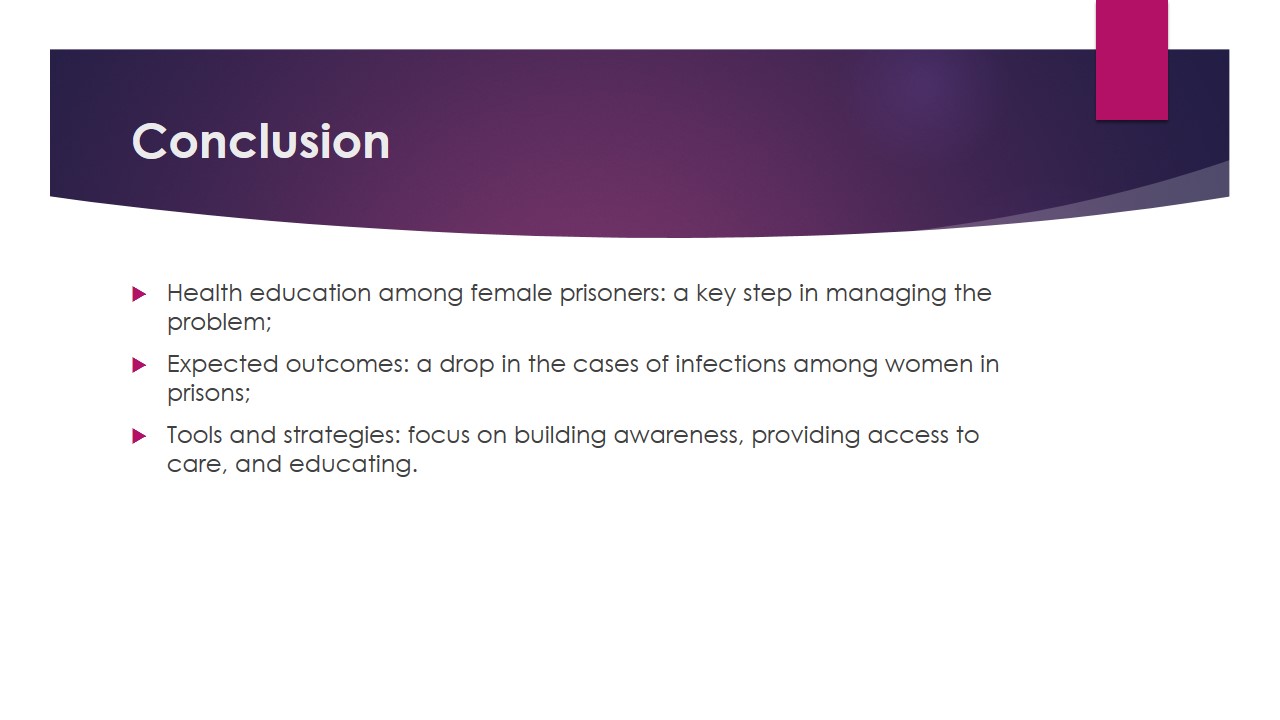
References
Fazel, S., Hayes, A. J., Bartellas, K., Clerici, M., & Trestman, R. (2016). Mental health of prisoners: Prevalence, adverse outcomes, and interventions. The Lancet Psychiatry, 3(9), 871-881. Web.
Mignon, S. (2016). Health issues of incarcerated women in the United States. Ciencia & SaudeColetiva, 21, 2051-2060. Web.
Van Hout, M. C., & Mhlanga-Gunda, R. (2018). Contemporary women prisoners health experiences, unique prison health care needs and health care outcomes in sub Saharan Africa: A scoping review of extant literature. BMC International Health and Human Rights, 18(1), 31-42. Web.